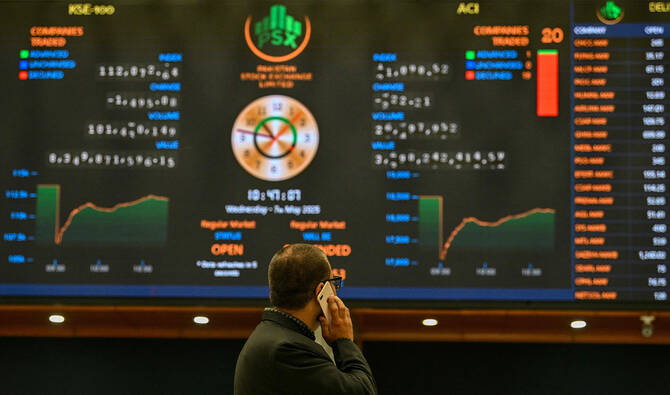KARACHI: The Pakistan Stock Exchange (PSX) rebounded sharply on Friday, climbing over 3,500 points, as investor sentiment improved ahead of an International Monetary Fund (IMF) Executive Board meeting and what some analysts described as easing tensions between Pakistan and India.
The benchmark KSE-100 index recovered 3,647.82 points, or 3.52 percent, closing at 107,541.45, after a historic plunge of 6,482 points on Thursday, the largest single-day drop in the index’s history, triggered by fears of an escalating conflict between the two nuclear-armed neighbors.
"The recovery was on account of optimism on IMF Executive Board meeting scheduled to consider Extended Fund Facility (EFF) program, where market expects smooth approval," Topline Market Review said after the end of trading. "Overall decline in cross border hostilities also provided stimulus to investor sentiment."
The EFF, a $7 billion loan program secured by Pakistan in September last year, is aimed at stabilizing the country's economy through structural reforms and fiscal consolidation.
While Pakistan’s authorities say macroeconomic indicators have improved in recent months, they view the IMF support as critical for sustaining gains and transitioning toward growth.
Some analysts also linked the improved investor confidence to what they described as a gradually easing geopolitical situation between India and Pakistan.
"Stocks staged sharp recovery as investor eye de-escalation in Pakistan-India tensions after US appeal for end to violence," Ahsan Mehanti, the Chief Executive Officer of Arif Habib Commodities, told Arab News.
Raza Jafri, the head of Intermarket Securities, said any de-escalation could extend the positive stock market trend.
"Institutional value buying, especially in blue-chip high dividend yielding stocks, saw the KSE100 rebound today," he added.
Tensions between India and Pakistan spiked this week after New Delhi launched missile strikes on multiple locations in Pakistan, blaming Islamabad for a deadly April 22 attack in Indian-administered Kashmir that killed 26 tourists. Pakistan has denied involvement.
The crisis triggered a 12 percent decline in the Pakistani market from April 23 to May 8.
The geopolitical unrest posed a major challenge for Prime Minister Shehbaz Sharif’s efforts to stabilize the economy, which depends on a number of factors including increased foreign investment, exports and revenue generation.











